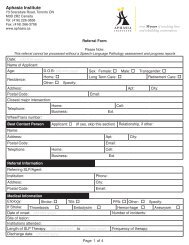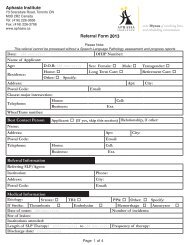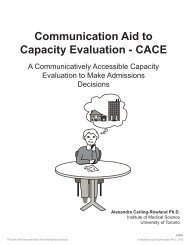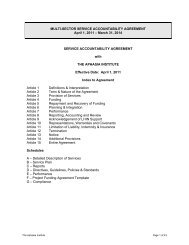SLP Survey Report_Final - Aphasia Institute
SLP Survey Report_Final - Aphasia Institute
SLP Survey Report_Final - Aphasia Institute
Create successful ePaper yourself
Turn your PDF publications into a flip-book with our unique Google optimized e-Paper software.
esearched for people with <strong>Aphasia</strong>.<br />
• Access to aphasia friendly materials availability of assistant or someone to provide daily<br />
practice education of family members, care workers for better understanding of aphasia<br />
community support - not enough clients with similar background to start an aphasia group<br />
• More current and relevant resources for aphasia.<br />
• Access to evidence - perhaps a practice lead to guide us to most up to date info<br />
• Access to aphasia friendly resources as timesavers<br />
• Access to current resources Access to evidence-based education Access to support<br />
Awareness of community resources Improved team processes<br />
• Better access to functional assessment tools<br />
• Easier access to journals better accessibility to professional peers telehealth opportunities<br />
• Easier access to aphasia friendly pre made material better access to group programs<br />
• Access to clinically relevant research that is functional in its approach<br />
• More direct 1on1 tx time with the <strong>SLP</strong> (as opposed to tx provided by support staff or many<br />
facilities' current push toward group therapy<br />
• Adequate <strong>SLP</strong> resources.<br />
• Access to more <strong>SLP</strong> staff Access to CDA support Access to Admin support CE Access to<br />
appropriate resources/environments<br />
• Better access to outpatient services and consistent follow up<br />
• More resources for staff, family education; development of aphasia friendly resources, etc.<br />
• Access to information on how to translate use of aphasia strategies to all staff on the unit.<br />
e.g. Communication mentorship<br />
• Provide more practical and more easily accessible tools such as apps in conjunction with<br />
evidence-based support for this in order to gain organizational buy-in to purchase IPADS<br />
& other mobile devices.<br />
• Resources to update materials<br />
• Need access to information so we can look it up<br />
• Solid research-based guidelines that are "do-able".<br />
• More community-based resources. The argument of hospital managers/administrators is<br />
that if pt's do not have nursing or physical needs, then they don't need to be in the hospital.<br />
I see their point. Unfortunately, communication intervention is not available outside the<br />
hospital. 3. Access to evidence: literature reviews about the most efficient & efficacious<br />
assessment and therapy interventions; how to best use the time we have with the pt.<br />
Management and Other Support<br />
• Need management support to make changes to support programming to implement change<br />
& increase therapy time/services - add more staff<br />
• Have others buy in to the importance of speech therapy 5) have buy in from family<br />
members on why they are key players<br />
• Support from physicians regarding stroke rehabilitation would be helpful.<br />
• Management support re: caseload<br />
• Receive support from the interdisciplinary team<br />
• I am concerned that in Ontario there is minimal support for people with aphasia in the<br />
acute care setting.<br />
<br />
49











